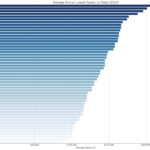When a creditor wins a lawsuit against you for unpaid debt, the court issues a judgment. This judgment empowers the creditor, now termed a “judgment creditor,” to pursue various legal avenues to recover the money you owe. As the “judgment debtor,” it’s crucial to understand your rights and the actions a creditor can legally take. A judgment can last for a significant period, often 12 years, and can be renewed, making it a long-term concern. This is where understanding the role of a judgment lawyer becomes essential.
This article will delve into the actions a judgment creditor can take to collect a debt and highlight situations where seeking advice from a judgment lawyer is not just beneficial, but often necessary to protect your financial well-being.
Actions a Judgment Creditor Can Take
If you fail to pay the judgment or reach a payment agreement, the judgment creditor has several legal tools at their disposal to collect the debt. These actions can significantly impact your finances and assets:
Collecting Information | Property Liens | Wage Garnishment | Bank Account Garnishment | Debt Satisfaction
Collecting Information
To effectively collect on a judgment, creditors often start by gathering detailed information about your financial situation.
- Judgment Debtor Information Sheet: In many jurisdictions, excluding small claims cases (typically under a certain dollar amount, like $5,000), a judgment creditor can request you complete a “Judgment Debtor Information Sheet.” This form requires you to disclose details about your employment, assets, debts, income, and expenses. Ignoring this form can escalate the situation.
- Interrogatories and Oral Examinations: If you don’t respond to the information sheet, or if the creditor seeks more in-depth information, they can petition the court to compel you to answer written questions under oath (Interrogatories) or appear in court for an Oral Examination. Failure to comply with a court summons can lead to serious consequences, including arrest.
When to Consult a Judgment Lawyer: If you receive a Judgment Debtor Information Sheet, especially in cases that are not small claims, or if you are facing Interrogatories or an Oral Examination, consulting a judgment lawyer is advisable. A lawyer can ensure you understand your obligations, help you accurately complete the forms, and advise you on protecting your assets legally. In small claims cases where you receive such forms, it’s especially important to seek legal counsel as this might be an overreach by the creditor.
Property Liens
A significant tool for judgment creditors is placing a lien on your property. A lien is a legal claim against your property that secures the debt.
- Judgment Lien: A money judgment automatically becomes a lien on your property for the judgment amount plus post-judgment interest.
- Recording the Lien: To make the lien public record and effective, the creditor must record it with the circuit court in the county where your property is located. This “attaches” the lien to your property, making it public knowledge that you owe this debt.
- Impact of a Lien: A property lien can severely restrict your ability to sell or refinance your property. Before any sale can be finalized, the judgment must be paid, often from the sale proceeds.
When to Consult a Judgment Lawyer: If a lien has been placed on your property, a judgment lawyer can help you understand your options. They can investigate the validity of the lien, negotiate with the creditor, and explore strategies to remove or minimize the impact of the lien on your property rights. A lawyer can also advise on whether the lien was properly recorded and if there are grounds to challenge it.
Alt text: Example of a Notice of Lien form, highlighting legal documentation related to property liens for debt judgments.
Wage Garnishment
Wage garnishment allows a judgment creditor to directly collect a portion of your earnings to satisfy the debt.
- Garnishment Request: The creditor requests the court to order your employer to withhold a percentage of your wages and remit it directly to the creditor.
- Contesting Garnishment: You have the legal right to contest a wage garnishment. You can file a motion with the court explaining your defense or objection.
- Wage Statement: Once garnishment starts, the creditor is legally obligated to provide you with a monthly statement detailing payments applied to the judgment.
- Job Protection: Federal and state laws offer some protection against job loss due to wage garnishment for a single debt within a calendar year.
Limitations on Wage Garnishment
Laws limit the amount that can be garnished from your paycheck to protect debtors from undue hardship. Typically, creditors cannot garnish more than 25% of your disposable earnings per pay period. For individuals earning near minimum wage, there are further protections to ensure a minimum livable income.
When to Consult a Judgment Lawyer: If your wages are being garnished, or if you receive notice of impending wage garnishment, a judgment lawyer can be invaluable. They can help you understand the garnishment process, ensure it is legally compliant, contest the garnishment if there are grounds to do so, and negotiate with the creditor to potentially reduce the garnishment amount or arrange an alternative payment plan. A lawyer can also advise on the legal limits of garnishment and ensure your rights are protected.
Bank Account Garnishment
Bank account garnishment is another powerful tool allowing creditors to seize funds directly from your bank account.
- Bank Garnishment Request: The creditor requests the court to issue a garnishment order against your bank.
- Account Freeze: Upon receiving the garnishment order, the bank is legally required to freeze funds in your account up to the judgment amount, including costs and interest. You will be unable to access these funds. Even subsequent deposits can be frozen.
- Confession of Assets: The bank will send a “Confession of Assets” to all parties and the court, detailing the amount being held, if any.
- Exemption Request: You have a limited time, typically 30 days, to request an exemption to protect certain funds in your account from garnishment.
Bank Garnishment Timeline
Understanding the timeline is crucial in bank garnishments:
Bank Garnishment Timeline Image
Exemptions from Bank Garnishment
Certain funds are legally protected from garnishment, known as exemptions. These exemptions are designed to protect essential income and benefits.
-
Automatic Exemption: Many jurisdictions provide an automatic exemption of a certain amount (e.g., $500) in your bank account, regardless of the source of funds.
-
Other Exemptions: Beyond the automatic exemption, many other types of income are exempt, such as:
- Social Security benefits
- Veterans benefits
- Child support payments
- Public assistance benefits (SNAP, welfare, etc.)
- Retirement funds (401k, IRA, pensions)
- Workers’ Compensation
- Unemployment Insurance
- Alimony
-
Spousal Property Exemption: In some cases, accounts held jointly by married individuals may be exempt, particularly if the account was opened before the judgment.
-
General Exemption: Some states also offer a broader “wildcard” exemption that allows you to exempt a certain dollar amount of any property, including bank account funds.
When to Consult a Judgment Lawyer: Bank garnishment can be incredibly disruptive. A judgment lawyer can be critical in navigating this complex process. They can:
- Advise you on available exemptions and whether your funds qualify.
- Help you prepare and file the necessary “Motion for Release of Property from Levy/Garnishment” to claim exemptions within the strict deadlines.
- Represent you in court if a hearing is scheduled regarding your exemption request.
- Negotiate with the creditor to release garnished funds or arrange a payment plan to avoid further garnishment.
- Ensure the bank and creditor are complying with all legal procedures.
A judgment lawyer can be your advocate in ensuring legally protected funds are not wrongfully seized and help you regain control of your bank account.
Alt text: Bank Garnishment Timeline infographic, visually outlining the steps and deadlines in the bank account garnishment process.
Requesting an Exemption
To claim exemptions, you typically need to file a “Motion for Release of Property from Levy/Garnishment.”
- Form Completion: This form requires specific details, including bank name, account type, and the last four digits of the account number.
- Exemption Basis: Clearly state the legal basis for your exemption. For instance, if you are claiming the general exemption, specify that. If claiming exemption based on the source of funds (like Social Security), clearly state the source.
- Filing and Service: File the motion with the court within the specified timeframe (usually 30 days of bank service) and ensure copies are served on all parties, including the bank and creditor.
- Court Hearing: A hearing may be scheduled to review your exemption claim. It is crucial to attend this hearing to support your request.
Debt Satisfaction
Once you have paid the debt in full, it’s essential to ensure the judgment is officially marked as satisfied to prevent further collection efforts and clear your credit record.
- Notice of Satisfaction: Legally, the creditor is obligated to notify the court when the debt is paid and provide you with a copy of this “Notice of Satisfaction.”
- Court Order: If the creditor fails to file a Notice of Satisfaction, you can petition the court to issue an order declaring the judgment satisfied. This often requires filing a “Motion for Order Declaring Judgment Satisfied.”
- Recovering Costs: In cases where you have to petition the court due to the creditor’s inaction, you may be able to recover costs associated with obtaining the order, potentially including attorney fees.
When to Consult a Judgment Lawyer: Even after you’ve paid the debt, issues can arise. If a creditor is unresponsive or fails to file the Notice of Satisfaction, a judgment lawyer can step in to ensure the judgment is properly closed. They can file the necessary motions, represent you in court if needed, and ensure your credit record accurately reflects the satisfied debt.
Resources and Legal Assistance
Navigating debt judgments and collection actions can be complex and stressful. Remember that resources and help are available. Court Help Centers can provide general information and guidance. For personalized legal advice and representation, especially when facing aggressive collection tactics, wage or bank garnishment, or property liens, consulting a judgment lawyer is strongly recommended.
Dealing with debt collectors and judgments requires understanding your rights and the legal processes involved. A judgment lawyer is your expert guide, ensuring your rights are protected and helping you navigate the path to financial recovery. If you are facing a judgment, seeking legal advice is a proactive step towards a more secure financial future.


